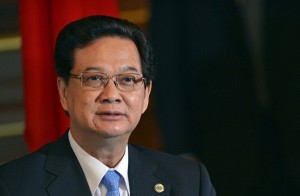HANOI – Vietnam’s prime minister pledged Thursday to step up economic reforms and prevent a repeat of riots targeting foreign-owned factories, seeking to reassure nervous investors.
Nguyen Tan Dung said the mid-May unrest, in which Beijing says four Chinese workers were killed, was “unprecedented and unexpected”.
“I can confirm that there will not be any more riots,” he said at a business forum in Hanoi, adding that the government would “ensure safety and security for foreign business and foreigners working, studying or living in Vietnam.”
“Place your confidence and trust in Vietnam,” he urged investors.
Since China moved an oil rig into waters claimed by Vietnam in early May, relations between the frequently quarrelsome communist neighbours spiralled to their lowest point in decades.
Taiwanese and Korean businesses were hit hardest by the unrest, which saw factories vandalised and set ablaze in parts of south and central Vietnam.
Dung said some 90 percent of affected businesses were now back to normal, and promised further assistance for those that were not.
Authorities “have taken measures to punish perpetrators and prevent this reoccurring”, Dung said.
He pledged to accelerate Vietnam’s domestic economic reforms with a bigger role for private firms, strengthened institutions and increased financial restructuring, and to pursue integration with the world economy.
“The whole economy needs to be restructured,” he said, adding that many major state-owned enterprises would be privatised this year.
The country is negotiating six different trade deals from the Trans-Pacific Partnership to bilateral deals with the European Union and South Korea, he said.
Dung highlighted the government’s recent economic track record, bringing sky-high inflation under control and steadily boosting GDP growth.
GDP growth is expected to be around 5.8 percent for 2014, followed by 6.0 percent in 2015 and 6.5 percent a year for the following four years, Dung said.
Dung “was clearly trying to encourage businesses,” said one of the forum participants, Tony Foster, of business law firm Freshfields Bruckhaus Deringer.
But “the one thing this country really had going for it was stability and security and now that’s gone out the window,” he added.
Edmund Malesky, an expert on Vietnam’s investment-fuelled development at Duke University, said that Dung’s speech — with its emphasis on new FTAs and integration into the global economy — hinted at a “restructuring of Vietnam’s foreign policy”.
Policymakers see the riots “as an opportunity to rethink foreign relations,” he said, adding they “are looking beyond just trade relations with China”.
